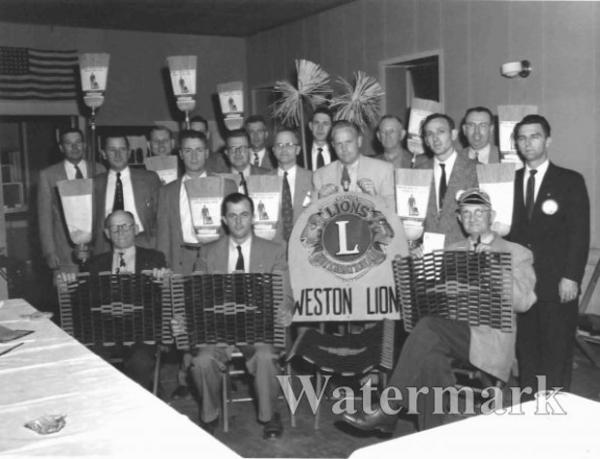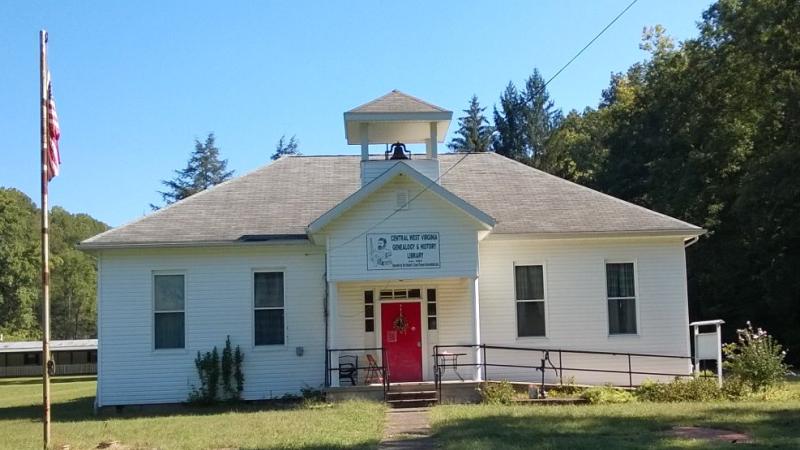50 States of Preservation: Hacker's Creek Pioneer Descendants in Horner, West Virginia

In this March 1955 photo, Weston Lions Club advertises their broom sale, the proceeds from which benefit persons with vision problems.
Image property of Hacker’s Creek Pioneer Descendants.

In this March 1955 photo, Weston Lions Club advertises their broom sale, the proceeds from which benefit persons with vision problems.
Image property of Hacker’s Creek Pioneer Descendants.
This feature is part of a series we call “50 States of Preservation,” in which we are touring small and mid-sized museums, libraries, historical societies, and other repositories across the country to show how they are helping to preserve the nation’s cultural heritage. Read other entries in the series here.
John Hacker was the first permanent European settler in Lewis County, West Virginia, when he moved west in the 1770s seeking land on the banks of the Monongahela River. Generations of settlers followed, and today, Hacker’s Creek Pioneer Descendants (HCPD) operates the Central West Virginia Genealogy and History Library and Museum, based in the town of Horner, to document their history. After years of gathering materials about West Virginian history, the library’s collections were in dangerous disarray and had outgrown their available space in a former three-room frame school house. An NEH award funded a preservation assessment to help the library save these materials by storing and caring for them properly.
The library’s collections are a lively point of interest in the community, outgrowing their original facility, moving into an addition, and inspiring a vibrant Web presence connecting residents with their past. Executive Director Patty Lesondak emphasized the importance of the NEH-funded preservation project to library efforts to preserve their collections and amplify interest from the public. “The program educated library staff on the proper storage of vintage items,” said Lesondak. “The addition is very helpful in attracting visitors and most people are amazed at the material we have to offer.”
Beginning in 1982 with just 92 members and a collection of two notebooks, the Central West Virginia Genealogy and History Library and Museum now contains more than 15,000 books, large periodical and obituary collections, over 6,000 catalogued photographs, thousands of cataloged manuscripts, hundreds of audiovisual items, and numerous maps, drawings, yearbooks, and county record books going back to the 1700s. The library also has 500 glass plate negatives of families and members of the community, the work of two early local photographers, Archie Ellis and William E. Carpenter. Finally, a large collection of artifacts and memorabilia donated by the Stonewall Jackson Heritage Arts and Crafts Jubilee Organization, now dissolved, includes wood carvings, woven and crocheted items, handmade quilts, porcelain and pewter plates, and handwoven baskets.
With support from NEH’s Division of Preservation and Access, HCPD was able to hire Charleston archivist Fredrick H. Armstrong, who recommended ways to preserve and safely display these materials His advice led the library to separate archival materials from the rest of the collection, construct a room accessible only to library staff to provide secure storage, store materials on appropriate metal shelving and archival boxes, and catalog and label previously unprocessed parts of the collection. The library also used the NEH award to acquire two glass cases to display items from the Stonewall Heritage Arts and Crafts Collection.
These activities helped rescue a collection documenting the history, genealogy, and traditions of Central West Virginia, focusing on the counties that were the first foothold of European settlers in the Trans-Allegheny region of old Virginia. Now the books, pictures, and objects are available to anyone interested in their personal and family history and the area’s culture and past. Genealogists, authors, and newspaper reporters use the books and articles, and the HCPD also displays items at the History Day competition for West Virginia students held annually in the Capitol Rotunda in Charleston, , where they are also viewed by state legislators and the public. The library’s materials have also been used in schools and educational programs including Boy Scouts, Girl Scouts, 4-H, heritage societies, Elderhostel, and community service organizations.
In every state, NEH supports organizations that preserve humanities collections. Preservation Assistance Grants for Smaller Institutions (PAGs) fund projects that help safeguard photographs, letters, documents, prints, moving images, sound recordings, maps, drawings, artworks, textiles, furniture, and artifacts, making them available for future generations. These collections help researchers, educators, and members of the public better understand the complex stories of the various cities, towns, and tribal groups that make up our nation. Since 2000, NEH has made nearly 2,000 Preservation Assistance Grants to small and mid-sized organizations to preserve and care for their humanities collections. In all 50 states, the District of Columbia, and Puerto Rico and the Virgin Islands, PAG awards have funded preservation assessments, purchase of shelving, environmental monitoring equipment, and preservation supplies, and training for staff. Organizations in all states and U.S. territories are eligible to apply, and the program encourages applications from those new to NEH. The next application deadline Preservation Assistance Grants for Smaller Institutions is May 2, 2017. If you have any questions about this grant program, please contact us at @email or 202-606-8570.







